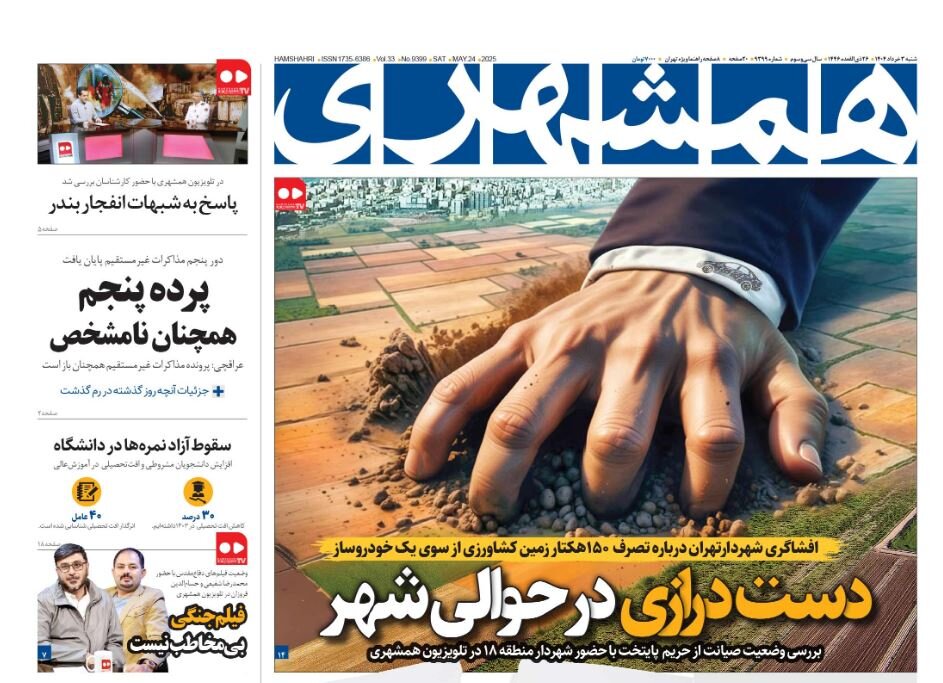Americans seeking a confusing approach in negotiation

TEHRAN - In a note, the Hamshahri newspaper addressed the holding of the fifth round of negotiations in Rome and the challenging and ambiguous conditions.
It wrote: Although Washington's contradictory statements regarding negotiations with Iran are not a new issue, this approach increased noticeably in the days leading to the fifth round of talks (on Friday), and the White House tried to put more pressure on Tehran beforehand with the tool of "threats and sanctions." The fifth round has been pursued with particular sensitivity by both sides. And despite the increasing rhetoric from the Washington-Tel Aviv axis, Iranian officials at various political-military levels have emphasized that they are prepared to face different scenarios both militarily and diplomatically. This is in a situation in which the confusing approach of American officials, and the American-Zionist threats have led experts to cast serious doubts about the White House’s willingness to advance the negotiations to reach a balanced agreement to an extent that the Iranian Foreign Minister, before the start of the negotiations, evaluated the proposition of “zero enrichment” by Iran as “the failure of the negotiations.”
Etemad: America is confused
In an interview with Nosratollah Tajik, a retired diplomat, Etemad discussed the Americans' confusion in the negotiations with Iran. He said: One of the possible reasons for contradictory remarks by American officials is Washington’s confusion regarding its policies towards Iran. It seems that America knows what it does not want, but it still does not know exactly what it does want. On one hand, U.S. officials have repeatedly stressed that they have no problem with Iran's peaceful nuclear program, but on the other, these same officials claim that Iran should not be allowed to enrich uranium. It should not be forgotten that the recent statements by U.S. officials came immediately after Trump visited Riyadh and also after Mr. Witkoff visited Israel. Some of these positions may be understandable in the context of the new regional coordination of the U.S. with its allies. Many realistic analysts emphasized that the U.S. president is not looking for war, but instead is pursuing maximum pressure. The use of various sticks, including the threat of Europe activating the snapback mechanism or making provocative statements, could be part of a broader strategy to gain more concessions from Iran and achieve Washington's goals.
Vatan-e-Emrooz: Captive of illusion
The Americans believe that Iran is in a weak position and they can get more concessions from Iran than in 2015 by claiming that a military attack will follow in case no agreement is reached. Trump, Witkoff, and Rubio believe they can get more concessions from Tehran by intensifying pressure on Iran. Accordingly, they believe that the threat of military action may make Iran retreat from its positions. However, the Leader of the Revolution, while warning and criticizing the nonsensical remarks by American officials, emphasized that Iran would pursue its nuclear rights based on its policies and according to its preferred approaches. The first effect of the Leader's words is the collapse of the illusion that Iran is in a weak position. If Trump has a real will to reach an agreement with Iran, he must accept the facts regarding Iran's nuclear program, as well as Iran's unbreakable red lines. Therefore, these red lines are still in place in the negotiations with the Trump administration. Trump must ultimately admit that he does not have the decisive leverage to deprive Iran of its nuclear rights. Neither military threats nor the threat of a breakdown in negotiations are credible threats to Iran.
Shargh: Role-playing in the middle of major disagreements
European powers threaten to trigger the snapback mechanism against Iran while holding diplomatic talks with Iran; Arab states, also using regional influence and shared security concerns, are trying to influence the course of the Iran-U.S. negotiations. Most of them share the common goal of preventing a nuclear-armed Iran and a devastating war in the region. However, the “fundamental differences” between Iran and the U.S., especially over the enrichment issue, and Tehran’s insistence that it will continue enrichment “with or without a deal,” make it difficult for third parties to play a role. The success or failure of the fifth round of talks in Rome will have far-reaching consequences not only for Iran and the U.S. but also for Europe and the Arab world. The ability of these actors to use their leverage constructively and to offer solutions that can at least satisfy the interests of all parties could play a crucial role in preventing a complete failure of diplomacy and moving toward a deeper crisis. However, until Washington and Tehran reach a common understanding on fundamental issues, the role of other actors will stay largely limited to crisis management and damage mitigation efforts.
Leave a Comment